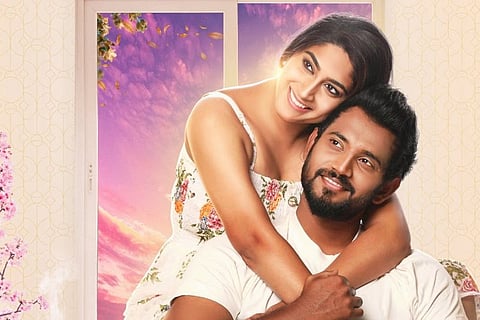

The romantic comedy genre has evolved constantly in Kannada cinema and it would be safe to say that actor Darling Krishna is the poster boy of the current iteration. Following the success of his 2020 film Love Mocktail, which he also directed and co-produced, Krishna has incessantly tried his hand at one ‘love story’ after the other in a valiant attempt to own the little niche for himself.
While he seems to be finding some kind of footing in this space and also commendably staying away from the beaten-to-death mass hero template, his films are becoming repetitive and devoid of any nuance. Case in point, his latest release Dil Pasand, a comedy drama about modern day relationships that is not only bizarre and confusing but also off-putting in the same measure.
Santhosh, or Santhu (Darling Krishna) as we are told in the animation title sequence, is fond of love and women from the day he was born. As a kid, he was often caught stealing kisses, making soulful proposals, and whatnot, but his father’s sheer dismay forced him not to bare his heart anymore. Cut to the present and Santhu, in the eyes of his parents, has grown up to be the docile boy that he was always meant to be. But the reality is far from it. If his office building elevator does not have women in it, he will not board it. And if he is unable to find a female companion, he is willing to get married for it.
And that’s where the women of the story come in and we immediately see binaries being drawn. Santhosh’s quest for love leads him to the very naive and ‘homely’ Minchu (Megha Shetty) who quivers at the very thought of her future husband hugging her. And on the opposite end of the spectrum is Aishwarya (Nishvika), a wealthy girl with whom Santhosh forges an equation that is centred on an unbelievably silly misunderstanding which also leads them to sleep together on a fateful night. How does Santhosh, who longed for female companionship all along, deal with this sudden overdose of love in his life?
On the surface, Dil Pasand has a promising setup for an engaging romcom if you were to overlook the cliches. You have the main protagonist who is a careful mix of goofiness and goodness, a love triangle comprising two polar opposites (Aishwarya is confident and outgoing, Minchu is anything but that), and a conundrum that helps him come of age. But to try and make things funnier and edgier, writer-director Shiva Tejass uses concepts like lust and physical appeal as his main tools to navigate his comedy of errors.
The intention with any romcom worth its salt is to reveal that the foundation of any relationship, regardless of its modern-ness, is love. But the approach to telling all this is so tacky that it is almost beyond belief. For starters, Shiva Tejass does not bother lending his characters any identifiable personalities but chooses to keep them shallow and boring. Santhosh detests Aishwarya because she begins to hold him at ransom for that one fateful night, but she also falls for him secretly and plots to keep him around her at all times. Minchu, who was repelled by her fiance Santhu’s early attempts at physical contact, suddenly realises that she too has sexual cravings. And yet, we never get to see what makes Santhu, the hero, charming to these women; instead, all we are offered is that he is a nice guy who will not ‘misuse’ any damsel in distress. Aishwarya and Minchu are pretty much one-dimensional too. If there is one thumb rule to putting together a love story, it is through characters that are flawed, endearing, and relatable.
Interestingly, for a film that is meant to be about today’s youth, Dil Pasand is glaringly conservative. The hero and the heroine, after spending the night together, do not refer to it as sex. In fact, the word ‘sex’ is not brought up even once in the entire film but is alluded to in countless ways, often through double entendres, raising the cringe levels to a new high. But the most baffling part comes in the pre-climax scene when the hero’s father spouts a long monologue about how culture and tradition supersede everything, even love, and how online chatting, dating, and live-in relationships are blots on society. It is at this point that you realise that the writer-director himself holds his own material in disdain and whatever little entertainment the film offered up till that point is nullified in one sweeping stroke.
Dil Pasand, which takes its name from a popular bakery delicacy in south India, is a film so messy that it almost begins to reek of insincerity towards the end. And to make things worse, it is not coherent either. Shiva Tejass’s story has sparks but they fizzle out the moment they crop up. The conventional enemies-to-lovers romance between Aishwarya and Santhosh has its moments but the writing does not allow it any depth. The screenplay too is very old-school, bland, and verbose, and it becomes apparent towards the end that for the film to work, it needed a lot more innovation and charm. Despite all the promise and opportunity, Dil Pasand feels undone by a shrill tone and an inorganic approach to a story that holds a lot more potential.
Disclaimer: This review was not paid for or commissioned by anyone associated with the film. Neither TNM nor any of its reviewers have any sort of business relationship with the film's producers or any other members of its cast and crew.